‘Theater Camp’ Directors Molly Gordon & Nick Lieberman On Making People “Believe” In Comedy Again At “A Scary Time For Art, In General”
- Oops!Something went wrong.Please try again later.
- Oops!Something went wrong.Please try again later.
- Oops!Something went wrong.Please try again later.
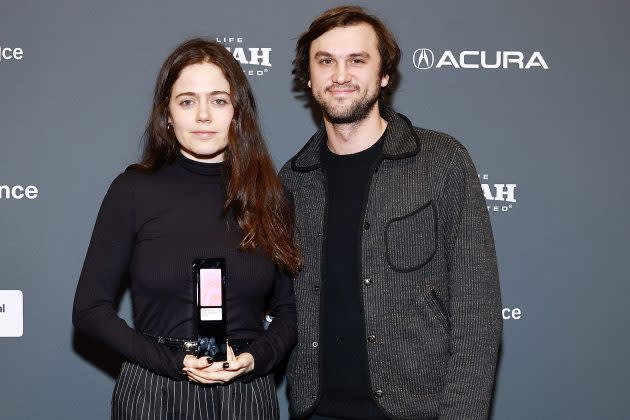
Between its improvisatory framework, 19-day shooting schedule amidst the pandemic, a sprawling ensemble stacked with child actors and an original, third-act musical put together in concert with composer Mark Sonnenblick, Searchlight Pictures’ Theater Camp was far from the easiest project to make as a first feature.
And yet it was the one taken on by directors Molly Gordon and Nick Lieberman, a pair of lifelong theater kids looking to pay tribute to an offbeat and heartfelt subculture that they know and love.
More from Deadline
Searchlight Pictures' Diana Loomis To Exit Studio At End Of The Summer
Taika Waititi Returning To Toronto Film Festival With World Premiere Of 'Next Goal Wins'
Elle Fanning Joins Timothée Chalamet In Searchlight Pictures' 'A Complete Unknown'
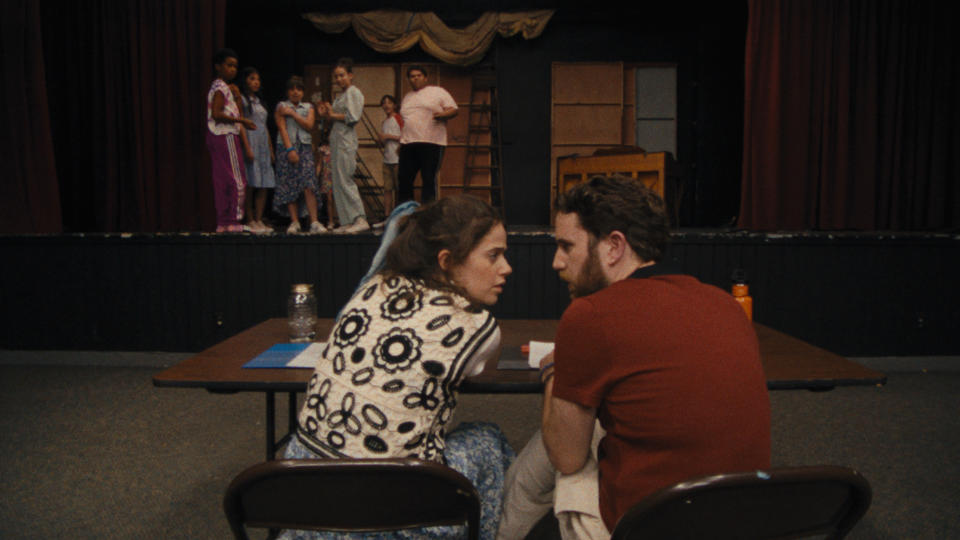
Written with their longtime friends Ben Platt and Noah Galvin, who star alongside Gordon (of The Bear Season 2), the comedy inspired in part by the works of Christopher Guest tells the story of a ragtag group of theater camp staffers who must rally to save their beloved upstate NY institution AdirondACTS when its owner suddenly falls ill. Made in partnership with Picturestart, Topic Studios and Gloria Sanchez Productions, the film based on a same-name 2020 short from the same team drew raves and a U.S. Dramatic Special Jury Award recognizing its ensemble upon its debut at this year’s Sundance Film Festival and was snapped up for around $8M with a theatrical guarantee.
A remarkably assured feature debut, Theater Camp is one of a number of high-profile comedies emerging at a tough time for the genre, which these days has in large part been relegated to streaming, amidst questions as to its draw in a theatrical context. Here, in a conversation conducted prior to the launch of the SAG-AFTRA strike, Gordon and Lieberman make a case for its future, even at what the former calls “a scary time for art, in general” — also spotlighting the “manic” fight they embarked on to will their film into existence, precisely as they envisioned it.
DEADLINE: Tell us about your personal experiences with theater camp. Were there teachers or counselors who made a particular impact on you?
MOLLY GORDON: Ben and I shared a theater teacher named Janet Adderley, who Ayo [Edebiri]’s character is named after, and she just treated me like an adult from the time I was three years old and was immediately like, “Use your trauma. Take this seriously.” I feel like she pushed me at such a young age, which was such a beautiful and insane thing to do to a kid. And I feel like I really wanted to use her kind of wild spirit in this film.
NICK LIEBERMAN: I had a similar thing, growing up doing theater, and then in high school I had a teacher by the name of Ted Walch who was super meaningful to Ben and me, and a lot of other really great people. He, too, had this true respect for you as a young person, and saw the truth of a kid before they could maybe see themselves, or before their parents would even maybe be able to understand who their kid is. I think [it was] that, coupled with, “Okay, yes, I’m seeing you. Yes, these beautiful moments are happening. But I need you to hit this spot exactly as it is in the next 15 minutes or something.” Our other teacher, Michele Spears, too, in high school, was so brilliant, was our improv teacher and is a huge part of this movie for us.
DEADLINE: To my understanding, Molly, the journey of getting the film off the ground began with a pitch to producer Jessica Elbaum. What was discussed, and how did you convince her that you could deliver on your vision?
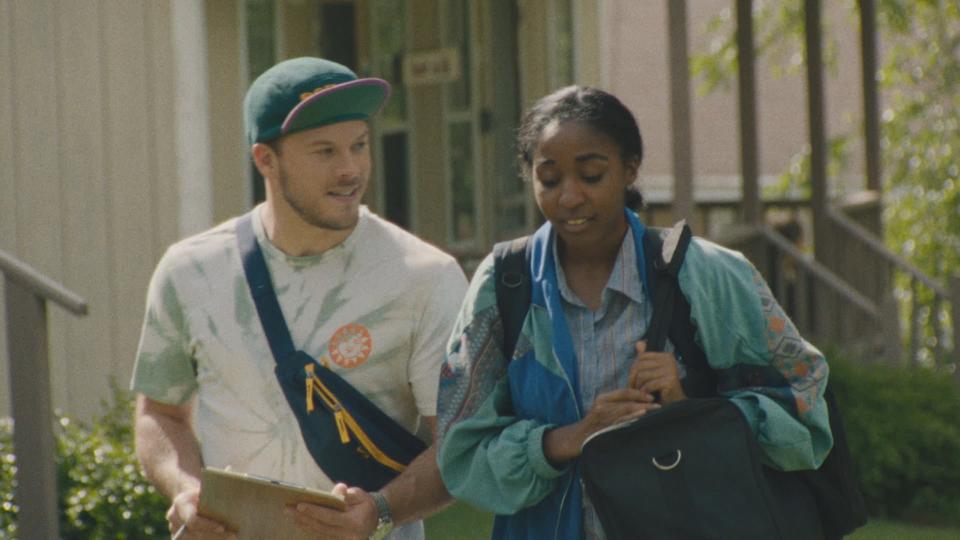
GORDON: It was really hard to get this made. We were trying to make an improvised film as first-time filmmakers, and in a market where comedy is not something people believe in anymore. I specifically could not give up on this project, in a way that was kind of manic and insane. And I just would not take no as an answer, in a way that I don’t know if I’ll ever be that manic again. I wish I could manifest that kind of intensity that I had at the time.
I met Jessica doing Booksmart, and I would always stay after I was done with my scenes. I just wanted to be a part of it in a deeper way. And she was like, “Can we get lunch? I see that you want more than this. You always can come to me if you have any ideas.” And so years later, when we were like, “What to do with this project?” we brought it to her. Noah was in Booksmart, too, so he knew her well, and she just really believed in it, and finally it was another person who just wouldn’t give up on it.
Even with her, it took a really long time to find the right place, and finally Picturestart was like, “I see the vision here.” Erik [Feig] worked on Napoleon Dynamite and Once and just saw, “Oh, there are movies that are odd and wear their heart on their sleeve, and they’re just not made anymore. And I want to be a part of something like this. I want to help these young losers make their first film.” Nick and I got to make our first film on our own terms, and that is a really special thing that we’ll always feel grateful to Erik for.
DEADLINE: It seems like this shoot must have posed no shortage of challenges, given the largely improvised nature of the film, the prevalence of kids in its cast and the 19 days you had to get it in the can. How did you prepare?
LIEBERMAN: I think you could only take one of those things you just said at a time. We were working off a ‘scriptment,’ so a lot of the dialogue was improvised. We had a sense of the structure, but [we were] then going through each scene and saying, “What does this scene need pre-written? How many jokes do we need written? How much structure do we need to give it?” Then, because we have just seen so much stuff together, and we both really love triangulating around a reference, a big part of our process was watching a ton of documentaries and rewatching a ton of things, and watching even just random YouTube theater camp clips and saying, “Ooh, the top of that armoire” or whatever, “look how messy that is. We definitely need those kinds of products.” Just trying to be as research-heavy as possible on the front end. Because during the[shoot] itself, it was not an environment that was conducive to being precious about anything.
GORDON: We were shooting like 360. Everything was on camera, so by the time we got to that point, it was like, you’re not going to be able to cling to any reference. My Google Drive is full of way too many references that…Nick and I still love, that we will hopefully get to use in other things. But I think it was a beautiful experience to be so completely overprepared and then let go of that once you were on set.
DEADLINE: Was it a major challenge to deal with restrictions, as far as time on set with the child actors?
GORDON: Yeah. The word “pumpkin-ing” makes my stomach hurt.
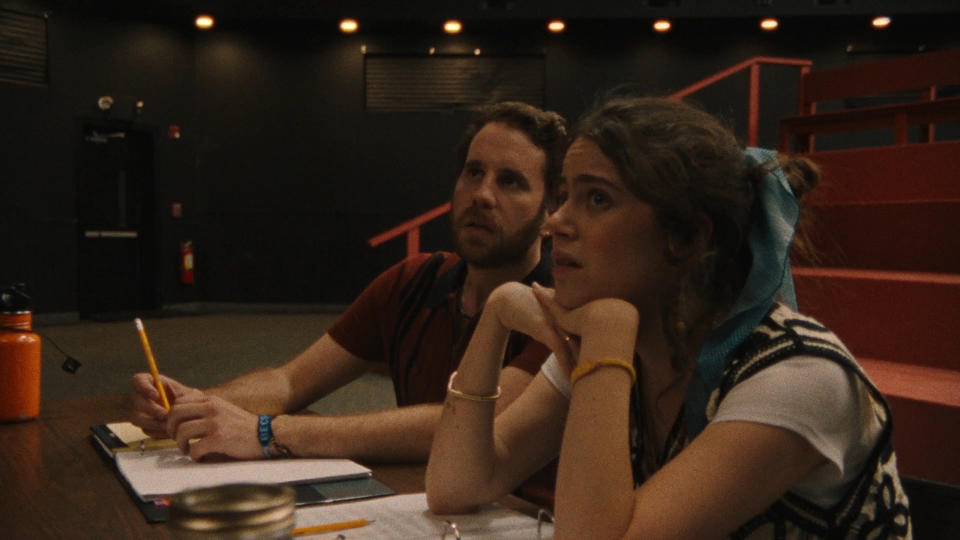
LIEBERMAN: Yeah, it was real. Because also, we were [at] a remote location, so it was from the time they get picked up to the time they get dropped off, including hair and makeup, including lunch, including them going to being tutored. So, it was just a situation where you were operating within a hair’s breadth of losing half our cast all the time, and really happened to be so loose, but also shooting around the fact that entire rooms were empty that needed to be filled with people. Even the group scenes, you know, that’s not just for the principal actors, that’s also for the extras. So it’s like, “Yay, we get like 60 kids for this scene, but you’re only going to have those 60 kids for half an hour.”
DEADLINE: Were there any guiding principles, as far as your filmmaking methodology was concerned, that were particularly helpful as you looked to navigate through this?
GORDON: You don’t need to do a million takes. We needed about 10 more days to make this movie, a hundred percent, but you can still have an insane creative freedom and do it in three takes. I think this will hopefully be the hardest thing we ever do, but I think going into other things as an actor, I was like, “Oh, I don’t need to be like, ‘Did I get it? Did I get it?’” Just trust and jump off the bridge.
LIEBERMAN: Part of that is that we were doing like seven-minute scenes that we knew were going to be two minutes.
GORDON: Totally. But even so, I feel like you get to a normal film that shoots in 45 days and they’re shooting a scene in a day. We would shoot like 10 scenes in a day, and it’s like, you can do it. I don’t know. I think you can kind of beat a scene to the ground, and the last 10 takes, you’re never going to use. Everyone’s starting to overthink it by that point.
LIEBERMAN: Yeah. Trying to be intuitive about what angles you need and not going off of this thing of like, “Okay, let’s make sure we have complete coverage of every single beat.” That just wasn’t possible. We shot with two cameras, but at the same time it was like, “Oh, it’s a group scene of seven people, and every single take, they’re doing something different.”
DEADLINE: Were you figuring out aspects to this methodology as you were making the film? It’s hard to imagine a more seamless end result.
GORDON: The best thing we ever did was hire a DP [Nate Hurtsellers] that works in documentaries because we would be like, “Run over there,” and he was already running. Sometimes it was like, “Just stay in one place, maybe,” because he’s so used to picking up the reality of life. We knew we needed someone who had worked with real people and wasn’t precious about lighting. We never would do beauty lighting. It was just someone who knew, “I have to capture whatever is in front of me, the best stuff possible.” But Nick and I knew exactly what we wanted it to look like before we wrote the movie. We always wanted it to look like it was shot on film.
LIEBERMAN: We think that that kind of grittier, vérité look and the way that a natural piece of lighting can then be so beautiful, especially when it feels that natural…I think that is a big part of the ethic of it, is just trying to make things feel as real as possible, in order to be beautiful and almost cinematic. There’s something that comes through that way…Editing the short together, I think we learned a lot over that time. I’d also been editing documentaries, [learning], “What do you need? How can you set yourself up?” There were certain things that we were doing differently on day 17 through 19 than we were doing at the very beginning, but a lot of the technique was pretty established about how we wanted to go about it.
GORDON: Having these lenses that they could run around, [so] that they felt very mobile [was important]. Like, we couldn’t have a crane suddenly. We couldn’t afford it. Maybe we would’ve loved to have a crane. But also, it needed to be people that were always trying to catch up with the action, and always just a little bit behind it. But Nate is brilliant, our DP. I think this is an incredible showcase of his work, and I’m so excited, in 20 years, to look back and see what he’s done.
DEADLINE: The kids in the film are incredible performers. How did you find them?
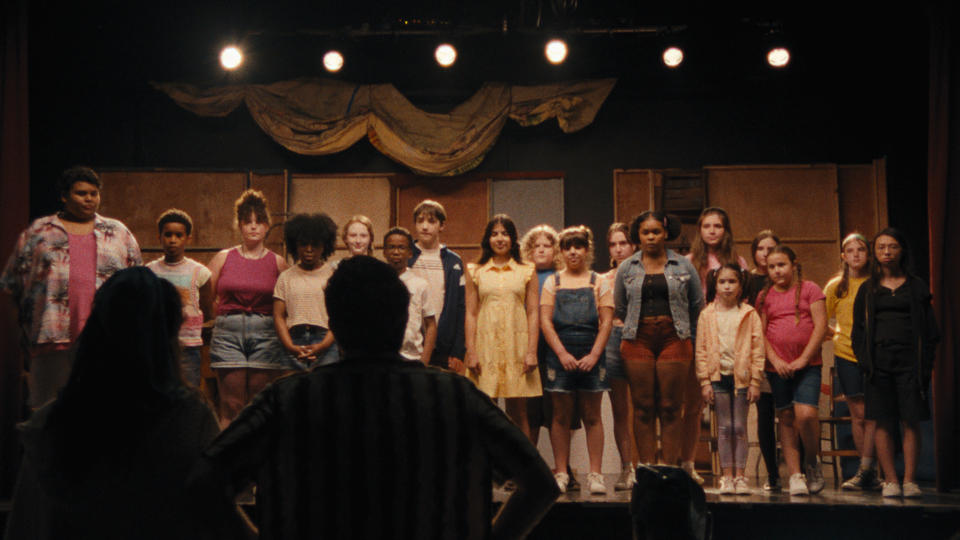
GORDON: They are kids that we found through our casting directors, Bernie Telsey and Kristian Charbonier. Nick and I were thinking about it before we started this: Kids on camera, kids in films is like the most beautiful thing in the entire world. And especially the way we were shooting it, with a super long lens and really close on their face, it’s like hope, that time in your life where anything is possible. We just wanted the most real kids, no one that felt like they were pushed there by their parents. People that felt like they just were like, “All I want to do is be a theater kid. This is all I’ve ever wanted.” And we were just so lucky that we found these amazing kids.
We had too many kids. I wish we could have made like seven movies with the amount of kids that we were presented with, but they’re amazing…Then, also, we wanted to represent the world for the reality of the actual world, not this film version, where kids are every shape and size, kids are every ethnicity, every gender. I think that’s what theater camp is. It’s a place where anyone can be themselves.
DEADLINE: What are your future plans as filmmakers?
GORDON: I think Nick and I are trying to sleep for two minutes, and then, I don’t know. We’re really focused on just wanting to make more things that come from the spirit of authenticity, and hoping we get the chance to make things like this again. I think it’s a scary time for art, in general. One, will we be paid for our art? And two, can real stories be put on screen? Or is it just Marvel?
LIEBERMAN: There is such value add in really drilling down and making a world feel genuine, and I think that does take some time. A lot of that work, we had done beforehand because we’ve lived it so much, so we really knew this world. But not [with] every story that Molly or I would want to tell would [we be able to] show up day one of development and know the world the way we do this world.
DEADLINE: Recent years have been tough for comedic features, so much so that some wonder if the genre is, in fact, theatrical anymore. Comedies like yours are testament to the fact that quality work is still being done. What more do you think will be necessary, then, to make them the kind of success they once were?
LIEBERMAN: I think when you think about just how long it’s been kind of in the life cycle, like a media life cycle of the last few years, with the pandemic especially, the institutional memory of what it’s like to go see a comedy before you’ve seen all the jokes meme-ified a million times, and you’re sitting there collectively in the dark and you’re earnestly surprised by what this movie is, and all laughing together, how special that experience is and how much those moments have meant to Molly and me over the years are a huge reason why we are even compelled to do this in the first place. I think it’s just getting that ball rolling again because everything went to zero inertia, freezing point. The success of one of these films or all of these films will just beget more success and increase the appetite for that risk-taking thing where it’s like, “Okay, I’m laughing. Maybe other people will laugh, too.”
GORDON: But also, it used to be, “What are we going to do night? Let’s go see a movie.” And with streaming it’s like, “Oh, I can go home and watch anything that I want.” And then you kind of end up not watching anything. I also think people need to ask more people on dates, one, to go see films. And two, I hope that see someone who goes and sees Joy Ride is like, “I had such a great time at the movies, I’m going to go see Barbie and Theater Camp and Bottoms, and all the other amazing comedies.”
DEADLINE: As an addendum to my last question, it seems like younger generations may have lost, or otherwise just don’t have quite the same appetite for cinema that so many others have shared. What, in your mind, can renew it?
GORDON: I think…original films. I just saw my friend Emma Seligman’s movie, Bottoms, and I literally felt like I was injected with life. I was like skipping home and I was like, “Oh my God…I’m so excited to be in this business. I’m so excited to go make something again. I think when we’re just given the same type of thing over and over again, with the same types of people, no one wants to go out and see them. But if we continue to tell different kinds of stories, and stories that people can see in their own life, hopefully, people will come out. But I don’t know. It’s hard for me sometimes to get to the theater. I think we’ve got to figure out how to reach more people.
LIEBERMAN: I don’t have a solution, but I do think trying to make the event something that’s more about quality and humanity rather than the event to be like, “You’ve never seen this effect implemented quite this way.” I think there’s value to those things, too. But at the end of the day, this idea that people don’t want stories that reflect the world that they’re actually living in, or that’s solely the domain of television that you’re going to have on while you’re on your phone, I think that that can’t be. We can’t just cede that ground.
GORDON: Totally. Even when we wanted to have the grain on our film, people were like, “Wait, but they need to be able to see it clearly. Because what if they’re doing other things [while they’re watching]?” You know what I mean? Things have become so bright lit because it’s like you have to be able to take in everything while you’re also on your computer and on your Apple watch. But that’s not how we should take in art.
LIEBERMAN: Right. I respect the fact that a lot of people just want to put something on while they’re making dinner. There’s no judgment on that. But at the same time, it’s like, there are things that you get more out of by actually voting with your feet and going to see them, and sitting and focusing and taking the time [for]. Let’s not pretend that that’s equivalent, I guess, to half pay attention to something while it’s playing in the background.
Best of Deadline
Sign up for Deadline's Newsletter. For the latest news, follow us on Facebook, Twitter, and Instagram.

